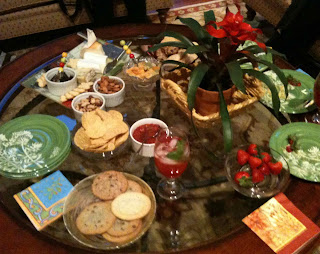 |
| Brie, fruit, gluten-free crackers and bunnies |
Title: How It All Began
Author: Penelope Lively
Host: Joanne
With apologies to Vicky, whose good guidance has kept us from ruining many a good book club discussion by firing right out of the chute with "well, I loved this book" or "I hated this book," we were unable to contain ourselves. First comment of the night on Penelope Lively's How It All Began -- "well, I for one loved this book," followed by the second comment -- "thank you for having us read this." We are unanimous in our affection for this fine work.
Insights and Opinions
+ Our group of Midwesterners fell in love with the essential Britishness of this book. Charlotte, one of the main characters who has been injured by a mugger, opines "Just what one didn't want. Being a burden and all that. What one had hoped to avoid." And, as Charlotte's daughter Rose recalls her first interview before being hired by Lord P -- "String of letters after his name; people sometimes glancing at him, thinking: why do I know that face? Shirty enough if anyone looked like taking liberties." Lots of stiff uppers throughout.+ One of the distinguishing aspects of this novel is the richness of its characters, especially the two older characters -- Charlotte and Lord Peters. These are real people, not just old people being old, as Joanne stated.
+ The academics among us found a lot to recognize in Mark, the unctuous, slimy academic with an agenda who sucks up to Lord Peter to satisfy his own ends.
+ Beautiful details add richness to the narrative without intruding. While riding in a cab, for instance, Charlotte establishes that her cab driver is from Eritrea "and that minicab driving was for him a secondary occupation that funded his main concern, which was the compilation of the first dictionary that would give three-way reference between English and the two main languages spoken in Eritrea. This conversation had been prompted by Charlotte's having noticed that he had a copy of Samuel Johnson's Rasselas lying on the passenger seat." A small vignette that tells us much about both Charlotte's character and the richness of London life.
+ The theme of "story" undergirds the book's structure -- from immigrant Anton's learning to read by consuming children's stories, to the value of reading in general, to the individual stories of each of the characters in the book following an arc of tension and coming to a satisfying conclusion.
+ Margy felt the characters in the book fell into two camps -- those who have lived their lives, and those who have merely ridden along on opportunity.
+ At nearly 80, Lively understands what it means to be on the second half of life. She delivers many wonderful passages about the difficulties of old age, all followed by beautiful passages that show how much joy she takes in life.
+ Definitely read the two-page section on reading as "necessary fix" on pages 34 and 35.
+ The style of this book is somewhat cinematic -- we slip quickly from one character's point of view to another's without apology.












